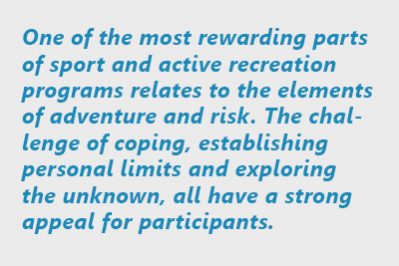Three ingredients for any successful sport and recreation program are safety, enjoyment and achievement.
An over-emphasis on safety can make a sport or active recreation experience dull and participants will not experience a sense of achievement. An exciting program that has too little emphasis on safety may lead participants to feel there are too many risks. This may result in feeling a sense of danger, which may lead to fear, and little enjoyment. It is important to strike a balance between the two.
One of the most rewarding parts of sport and active recreation programs relates to the elements of adventure and risk. The challenge of coping, establishing personal limits and exploring the unknown, all have a strong appeal for participants. The leader must be able to assess how far the considerations of safety may be relaxed in providing for challenge, and when safety is paramount. Safety considerations should work ‘for’ rather than ‘against’ the sense of adventure, excitement, achievement, learning and enjoyment.
Sport and active recreation settings are rather unique programs. The leaders form the core of the program community. The way the leaders interact, cooperate and plan together will have a great bearing on the quality of the program. It is important for each leader to contribute to the formation of a cohesive team. This will involve input in planning, evaluating what is happening on the program, assisting others to remain informed on what is happening, and providing the light relief when others may be getting bogged down or taking things too seriously. As you might imagine, being a leader in a sport or active recreation program can be demanding, yet a highly enjoyable task.
The diverse backgrounds of leaders usually provide a balance of skills, talents and qualities. Usually one of the team is able to provide humour and light relief when required. Someone else may have fine-tuned rational thinking skills and be able to provide a solution to an unforeseen problem. Recognize your skills and qualities and contribute when required.
All leaders should be involved in the planning process. A leader is a facilitator, not just a helper who carries out certain required tasks. This involvement is essential to remaining informed, feeling an ownership of the programs direction and being responsible for outcomes. People bring information to the group and some individuals have particular insights and notice things that others may miss.
The leader is concerned about the participant’s health and monitors their feelings: are they well, homesick or tired? Have they had enough to eat? Are they sufficiently warm? How are they getting home? Do they have knowledge of rules and are they able to follow them? Do they interact well with others? Have they rewarded appropriate behaviour and been modeling appropriate behaviour?
Good leadership requires:
Experience- the sensitive leader will have an appreciation of how participants are feeling at any given time.
Attitude- a leader’s positive attitude towards the participants and other leaders is essential. A leader who is preoccupied with their own needs will not achieve this.
Communication- good communication(both verbal and non-verbal) is a vital skill in leadership. The leader should recognize the sensitivity of all messages that are relayed.
Self-Control- practice controlling your own anger, anxiety or boredom – these can cloud the messages you receive from other people and also affect your decision making. Know your own strengths and weakness and the influence that these have on your decision making.

